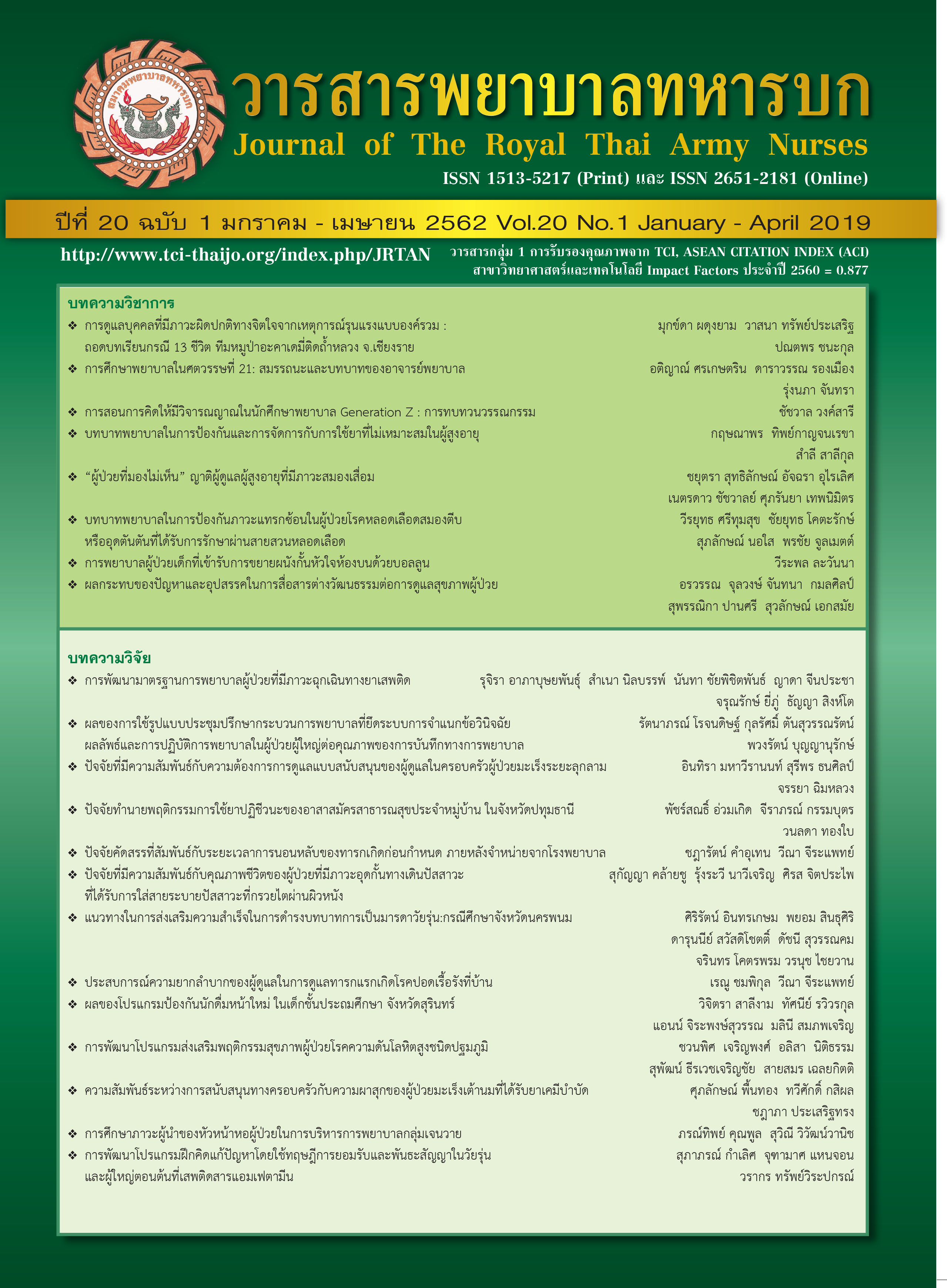The Effect of Psycho-Education Combined with Social Media Program on Symptom Severity of Persons with Bipolar Disorder
Keywords:
bipolar disorder, psycho-education, social media, symptom severityAbstract
This research is a quasi-experimental research design were used nonequivalent comparison-group design. The objectives were to compare symptom severity of patients with bipolar disorder before and after receiving the psycho-education combined with social media program and compare symptom severity of patients with bipolar disorder after receiving the psycho-education combined with social media program to patients who are received regular nursing care. The samples were 40 patients with bipolar disorder who were the out patients of Nakornratchasima Rajanagarindra Psychiatric Hospital. The patients were matched pair with genders, depression level scores, and mania level scores, and also samples to experimental group, consisting of 20 subjects while the control group of 20 subjects. The research instruments comprised: 1) psycho-education combined with internet supported program, 2) Brief Bipolar Disorder Symptom Scale, 3) Knowledge on Bipolar Disorder Test, 4) Self-management Interview for Bipolar Disorder, 5) Hamilton Rating Scale for Depression, and 6) Thai Mania Rating Scale. All instruments had been validated the content from five experts. The validity, Cronbach’s alpha coefficient of instrument 2 was .85 respectively. T-test was used to analyze data. The results showed that symptom severity of patients with bipolar disorder after receiving the psycho-education combined with social media program was lower than before receiving the program at a .05 level of significance and symptom severity of patients with bipolar disorder receiving the psycho-education combined with social media program was lower than the patients who were received regular nursing care at a .05 level of significance
Downloads
References
Laytrakul, M. and Suankanishi, P. Psychiatry, Ramathibodi. 2nd Edition. Bangkok: Beyon Entertainment; 2005. (in Thai).
Merikangas KR, Jin R, He JP, Kessler RC, Lee S, Sampson NA. Prevalence and correlates of bipolar spectrum disorder in the world mental health survey initiative. Archives of general psychiatry. 2011;68.
Information Center Planning Division Department of Mental Health. Service statistics of departments under the department Mental Health Annual 2015. Nonthaburi: Department of Mental Health Ministry. public health ; 2015. (in Thai).
Psychiatric Hospital Srithanya Annual report, 2015. Department of Mental Health, Ministry of Public Health. Nonthaburi: Department of Mental Health Ministry. public health ; 2015. (in Thai).
Psychiatric Hospital Nakhonratchasima Rajanagarindra Annual report of the year 2016 Department of Mental Health, Ministry of Public Health; 2015. (in Thai).
Morgan VA, Mitchell PB, Jablensky AV. The epidemiology of bipolar disorder: sociodemographic, disability and service utilization data from the Australian National Study of Low Prevalence (Psychotic) Disorders. Bipolar disorders. 2005;7(4):326-37.
Miklowitz DJ. Adjunctive psychotherapy for bipolar disorder: state of the evidence. The American journal of psychiatry. 2008;165.
Woods SW. The economic burden of bipolar disease. The Journal of clinical psychiatry. 2000;61 Supp 13:38-41.
Lopez P, Mosquera F, de Leon J, Gutierrez M, Ezcurra J, Ramirez F, et al. Suicide attempts in bipolar patients. The Journal of clinical psychiatry. 2001;62(12):963-6.
Lyons JS, O’Mahoney MT, Miller SI, Neme J, Kabat J, Miller F. Predicting readmission to the psychiatric hospital in a managed care environment:
implications for quality indicators. The American journal of psychiatry. 1997;154(3):337-40.
Dennehy EB, Suppes T, Crismon ML, Toprac M, Carmody TJ, Rush AJ Development of the Brief Bipolar Disorder Symptom Scale for patients with bipolar disorder. Psychiatry research. 2004;127(1–2):137-45.
Phaphak, S. Emotional Disorders. 1st edition. Khon Kaen: Siripan Printing Works. Offset.1999. (in Thai).
Lueboontawatchai, O. Mental Health and Psychiatric Nursing. 4th edition. Bangkok: Chulalongkorn University; 2011. (in Thai).
Bellivier F, Yon L, Luquiens A, Azorin JM, Bertsch J, Gerard S, et al. Suicidal attempts in bipolar disorder: results from an observational study (EMBLEM). Bipolar disorders. 2011;13(4):377-86.
Laoprasertsuk, K. Family-focused treatment program for violence. Of symptoms in bipolar mood disorder. [dissertation]. Bangkok: Chulalongkorn University. 2012. (in Thai).
Colom F, Vieta E, Martinez-Aran A, Reinares M, Goikolea JM, Benabarre A. A randomized trial on the efficacy of group psychoeducation in the prophylaxis of recurrences in bipolar patients whose disease is in remission. Archives of general psychiatry. 2003;60.
Colom, F., Vieta, E. Psychoeducaction manual for bipolar disorder. India:Macmillan. 2006.
Thongpaknam, C. The Relationships among Knowledge, Attitude and Behavior in Using Information Technology for Nursing of Air Force Nursing students in Royal Thai Air Force Nursing College, Academic Year 2016. Journal of The Royal Thai Army Nurses. 2016; 18(3): 217-227. (in Thai)
Palmier-Claus JE, Rogers A, Ainsworth J, Machin M, Barrowclough C, Laverty L, et al. Integrating mobile-phone based assessment for psychosis into people’s everyday lives and clinical care: a qualitative study. BMC psychiatry. 2013; 13(1):34.
Jonassen, D. H. Supporting communities with technology: A vision for integrating techonlogy with learning in schools. Educational Technology.
1995; 35(2). 60-63.
Latalova K, Prasko J, Kamaradova D, Jelenova D, Ociskova M, Sedlackova Z. Internet psychoeducation for bipolar affective disorder: basis for preparation and first experiences. The Psychiatric quarterly. 2014;85(2):241-55.
Downloads
Published
How to Cite
Issue
Section
License
บทความหรือข้อคิดเห็นใดใดที่ปรากฏในวารสารพยาบาลทหารบกเป็นวรรณกรรมของผู้เขียน ซึ่งบรรณาธิการหรือสมาคมพยาบาลทหารบก ไม่จำเป็นต้องเห็นด้วย
บทความที่ได้รับการตีพิมพ์เป็นลิขสิทธิ์ของวารสารพยาบาลทหารบก
The ideas and opinions expressed in the Journal of The Royal Thai Army Nurses are those of the authors and not necessarily those
of the editor or Royal Thai Army Nurses Association.






